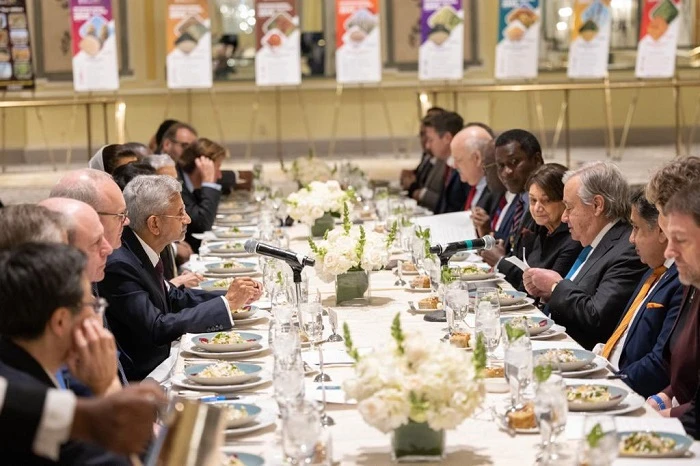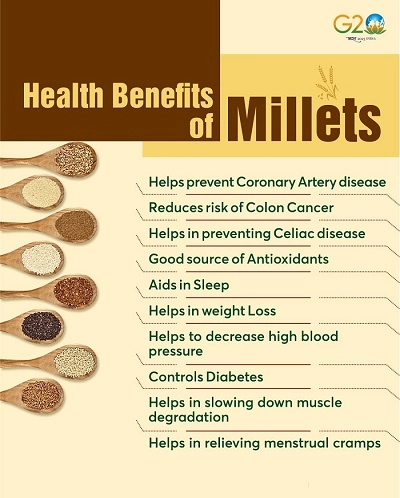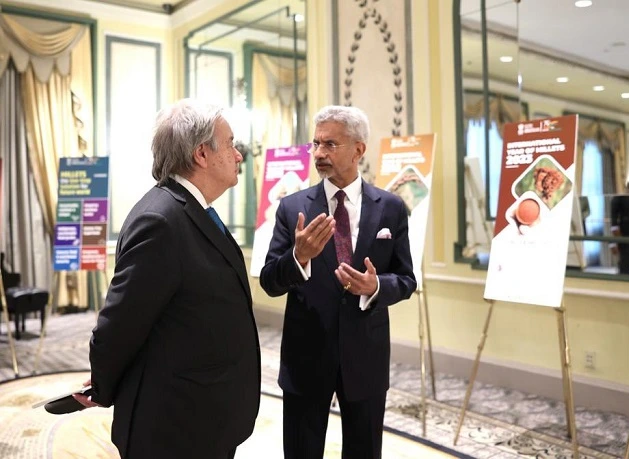Heading into the International Year of Millets in 2023, External Affairs Minister S Jaishankar hosted United Nations Secretary-General Antonio Guterres and other members of United Nations Security Council (UNSC) for a millets-based lunch in New York on Friday.
As part of the vision and agenda of Prime Minister Narendra Modi, India has been at the forefront of backing the initiative as millets make a comeback with people valuing traditional, organic and indigenous food grains.
Millets, often called “Nutri-Cereals” encompass a diverse group of cereals and were among the first plants that were domesticated and have served as a traditional staple crop for millions of families in Sub-Saharan Africa and Asia.
 More than 90% of millet production today takes place in developing countries of Africa and Asia.
More than 90% of millet production today takes place in developing countries of Africa and Asia.
India, which produces nine kinds of millets, has seen Bajra cultivation since ancient times and is a part of the diet to various states including Rajasthan, Uttar Pradesh, Haryana and Gujarat.
2023 is International Year of Millets. Thanks @ruchirakamboj of @IndiaUNNewYork for a delicious lunch made from 7 kinds of millet & chaired by H.E @DrSJaishankar for the Security Council & SG @antonioguterres. It was my last & best #UNSC lunch! pic.twitter.com/8F8VbgnBBv
— Martin Kimani (@AmbMKimani) December 16, 2022
Millets provide high energy, high dietary fiber, proteins, many essential minerals, vitamins, and antioxidants, all of which play a substantial role in lowering diabetes. The diversity of millets offers opportunities for economic development through income-generating activities in the food sector.
Millets also grow on poor soils with little or no inputs, have a low carbon and water footprint, are resistant to many crop diseases and pests and can survive in adverse climatic conditions.
Know about the millets in this #IYM2023, know about health Benefits of Millets based processed Millets Food.#InternationalYearOfMillets @AgriGoI @investindia @PMFMEScheme @investindia @mygovindia @PIB_India @PashupatiParas @prahladspatel pic.twitter.com/W9CMi5v4kz
— FOOD PROCESSING MIN (@MOFPI_GOI) December 15, 2022
While millet cultivation has been historically widespread, their production is declining in many countries. There is an urgent need to promote the nutritional and ecological benefit of millets to consumers, producers, and decision-makers, to improve production efficiencies, research, and development investments and food sector linkages.

The commemoration of the International Year of Millets will help in creating greater awareness of millet production. It will contribute to food security, nutrition, ensuring livelihoods and incomes of farmers, poverty eradication and the achievement of the SDGs, particularly in regions that are drought prone or threatened by climate change. It will also help promote millets as a key component of the food basket.
Also Read: In message to FAO, PM Modi calls for a global mass movement to promote millets



















